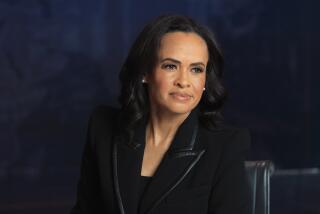A Stranger-Than-Fiction Format Pulls In Viewers : Television: Newsmagazines have become the TV dramas of the ‘90s, but critics say the programs are often too narrowly focused and rely on ‘peeping-Tom journalism.’
- Share via
NEW YORK — There was a time when network news divisions had to fight to get a show on in prime time. No more. On a recent Thursday night, viewers had the opportunity to choose among three newsmagazines: “Eye to Eye With Connie Chung” on CBS, “PrimeTime Live” on ABC and a special edition of “Dateline NBC.”
The stories ranged from reports on congressional pensions and gasoline pump rip-offs to features about killer whales in marine amusement parks. There was a profile of “Seinfeld” actor Michael Richards, an interview with a Navy officer whose career was harmed by a forbidden romance with an enlisted woman, and a portrait of the parents of Siamese twins as they confronted the decision to separate their children.
*
“Newsmagazines are the TV dramas of the 1990s,” observes NBC News producer Jeff Zucker. “At a time when the entertainment divisions are having difficulty creating successful fictional dramas, viewers are tuning in to see dramatic stories of real-life people on newsmagazines.”
Zucker, 28, who already has produced the “Today” show and “NBC Nightly News,” is the executive producer of “Now,” an NBC newsmagazine premiering Aug. 18, with Tom Brokaw and Katie Couric as anchors.
It will be the third network newsmagazine to premiere this summer and will bring to nine the number of such shows that air weekly. ABC already has a 10th planned for next spring.
Initially conceived as low-cost alternatives to entertainment programming, newsmagazines are proving to be ratings winners too. CBS’ “60 Minutes” was the No. 1 show in the Nielsen ratings last season, and CBS’ “48 Hours” and ABC’s “20/20” and “PrimeTime Live” also finished among the Top 30 shows. This summer, ratings for newsmagazines have been even stronger against entertainment reruns; they constituted five of the 10 highest-rated shows on TV last week.
But what kind of journalism are they providing? The producers say that serious subjects are being covered, while critics complain that, in the quest to be competitive in the ratings, the stories are often too narrowly focused, rely too heavily on emotion and fail to provide the depth, context and overview that were once hallmarks of the hourlong “CBS Reports” and “ABC Closeups.”
“They’re becoming indistinguishable,” Reuven Frank, a former president of NBC News, complained about the current crop of TV newsmagazines. “They compete with each other and with the tabloid shows. They don’t have much style, and they don’t deal with anything very big. It’s peeping-Tom journalism--all these stories about people’s intimate problems, sexual and psychological. It’s like Oprah and Geraldo with better production values. You don’t see an attempt to deal with the big problems that are facing the society.”
The newsmagazines are required to get good ratings to survive and, as a result, “they have bought into the culture of TV entertainment,” said Marvin Kalb, a former CBS and NBC correspondent who is director of the Shorenstein Barone Center on the Press, Politics and Public Policy at Harvard University. “They like to go with a story of a well-known actor or one family besieged by evil. They might do one story on an overriding story of national importance like the Gulf War, but basically what you’re looking at is personalities and sexuality in shows that have the contours of entertainment with a serious sub-structure.”
Newsmagazine producers dispute the view that they are not covering issues. “Some newsmagazines are lighter than others,” said Rick Kaplan, executive producer of ABC’s “PrimeTime Live,” declining to say which. “But, by and large, I think the broadcast newsmagazines are making a serious effort to cover stories that affect people’s lives.”
In addition to providing newsmaker interviews, such as a recent one with William Sessions after he was fired as FBI director, “PrimeTime Live” has won awards for several investigative reports, including one on packaging and safety conditions at a supermarket chain, one on racial bias and another on congressmen on a Caribbean trip paid for by lobbyists.
Tabloid treatment or an interview with a reclusive celebrity is likely to juice the weekly ratings, producers acknowledge. But CBS anchor Dan Rather maintains that the newsmagazines that endure offer something more substantial.
“There is fierce competition among newsmagazines, and that can create pressure to go for the common denominator,” said Rather, who hosts “48 Hours,” which takes a single topic each week and covers it with a variety of stories and correspondents. “But I think the record shows that ’60 Minutes’ has succeeded with serious stories and serious standards. We certainly have to be concerned with ratings on ’48 Hours,’ and we’ve been told it was suicidal to do stories on the economy or Israelis and Palestinians. But we did those stories. If viewers think you’re offering something of quality overall, you don’t have to win the ratings every week to survive.”
Still, Don Hewitt, the executive producer of “60 Minutes,” expressed concern about the pressure on the news divisions to create newsmagazines. During a recent lecture at the Museum of Television and Radio in New York, Hewitt said, “If the networks think there aren’t enough first-rate entertainment producers in Hollywood to fill up their prime-time schedules with worthwhile programming, what makes them think there are enough first-rate newsmagazine producers who can do that? . . . What it adds up to in too many cases is less about reporting news to America than it is about giving notice to Hollywood that ‘anything you can do, we can do cheaper (financially).’ ”
Joan Konner, the dean of the Columbia University Graduate School of Journalism, said that it’s what’s not regularly on the networks that is troubling.
“There is good work being done on some of the newsmagazines, but in no way are newsmagazines a substitute for the hourlong documentary,” said Konner, who was an Emmy Award-winning documentary film producer at NBC and PBS.
More to Read
The biggest entertainment stories
Get our big stories about Hollywood, film, television, music, arts, culture and more right in your inbox as soon as they publish.
You may occasionally receive promotional content from the Los Angeles Times.










